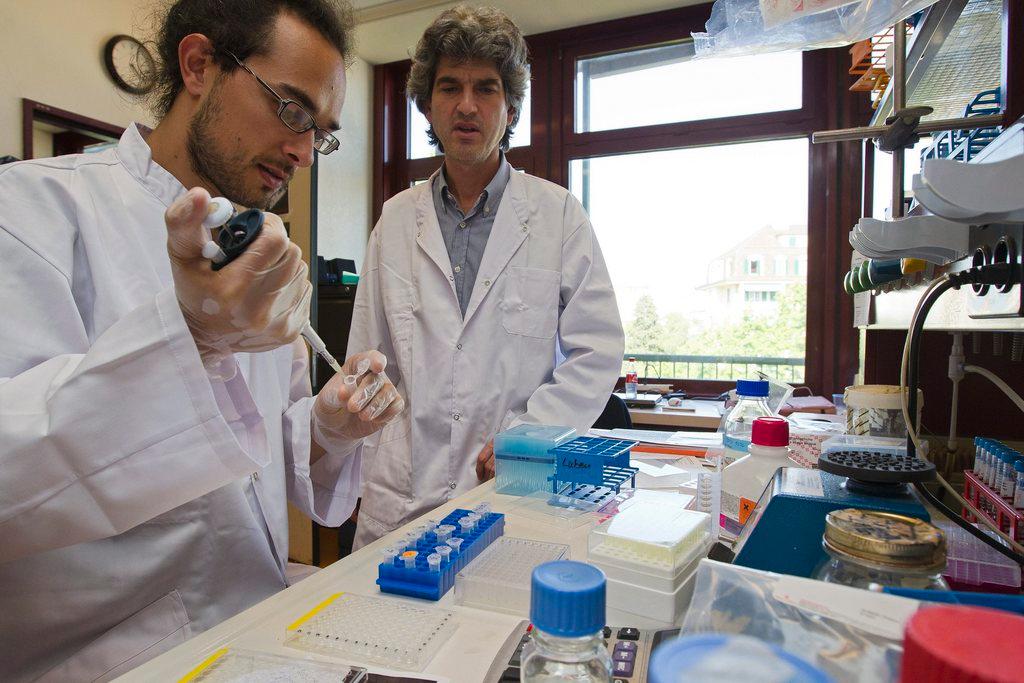Geneva private universities come under the spotlight

Some private universities in Switzerland offer degrees that are not recognised in Switzerland, reports Swiss public broadcaster RTS, which has looked into the situation in Geneva. But the situation is set to change. From 2023, the designation of “university” will be protected.
Baptiste (not his real name) is from French-speaking canton Geneva. After sailing through compulsory schooling without hassle, his first year at public university did not go so well. The packed auditoriums and lack of supervision made him lose his bearings. After failing two sets of key exams, he was excluded from the public higher education system.
As he wanted to continue his studies, the private sector became his only option. He chose a higher education institution in his home canton that promised quality teaching and mentoring. But the reality soon proved otherwise. As the months went by, more and more classes were cancelled at the last minute and the quality of the teaching deteriorated.
During the second year of his bachelor’s degree, Baptiste was the only student left in his cohort for several weeks. All the others had dropped out of the programme. The Geneva native left the university shortly afterwards and finished his studies at another private university.
Geneva, hub of private universities
For some students, attending a private university can seem like the right move. Those who do not feel comfortable in the public system may seek and find more personalised tuition, or what looks like their dream course in these institutions. However, it is important that prospective students know what they are getting into, before embarking on a bachelor’s degree that can set them back by up to CHF90,000 ($93,000).
In a recent survey, RTS identified External link13 private for-profit universities in the canton of Geneva alone – and the list is not exhaustive. RTS contacted them all. Here is an overview of some of its findings.
There are, of course, wide-ranging differences among the universities surveyed. And, while practically none of them are recognised by the public universities in French-speaking SwitzerlandExternal link, most of them offer diplomas that are recognised abroad.
Unscrupulous practices
Some private universities, however, may have unpleasant surprises in store for their students. Earlier this year, the independent media Geneva Observer published two investigations on the practices of certain private educational institutions in the canton, based on dozens of testimonies it had collected. The findings are damning, including reports of unrecognised diplomas and aggressive marketing techniques.
RTS talked to Ana (not her real name), from Romania. She was 22 years old in 2013 when she decided to leave her home country, after completing a bachelor’s degree in law, to pursue her studies abroad. Her father, a university teacher in Bucharest, advised her to go to Switzerland.
After some searching, Ana thought she had found the perfect course at a private university in Geneva. She travelled there and visited the campus, and everything seemed perfectly normal. However, just days before the start of term, she got a shock. After reading the testimonies of former students on a Facebook group, she realised that the diploma awarded by the school was not recognised. She decided to cancel her enrolment immediately and managed to get a full refund.
The average cost of one semester of tuition for a bachelor’s degree at these 13 institutions is CHF10,589. On top of this, most establishments also charge administrative and registration fees. Students therefore pay an average of nearly CHF65,000 for their three-year course. But the problems may sometimes start as soon as the first instalment is paid.
Diane, from Cameroon, was looking for somewhere to do her master’s degree in 2011. She was targeted on Facebook by an advertisement for a private university in Geneva. Her family decided to support her financially. To apply for a visa at the embassy in Cameroon, Diane needed proof of enrolment. For this, the university administration asked the future student to pay a deposit of CHF7,000. She did so, and received the requisite certificate from the university, but her visa application was turned down.
Diane then asked the university to refund the deposit. To this day, it has still not reimbursed her, despite her countless attempts to contact them.
An unregulated and lucrative market
Switzerland is unique in its hands-off approach to private higher education. “Switzerland stands out in the way it manages and oversees private higher education,” says Craig Evan Klafter, a specialist in the globalisation of higher education. “The lack of oversight and regulation has led investors to regard education as a highly lucrative market.”
The Geneva cantonal department of education, meanwhile, stressed that “all private tuition contracts fall within the sphere of private law and are not the responsibility of the State”, and that “activities of this kind are carried out in accordance with the principle of economic freedom enshrined in article 27 of the Constitution”.
Nonetheless, some tightening up of the sector is imminent. The Federal Act on Funding and Coordination of the Swiss Higher Education Sector (Higher Education Act), which came into effect in 2015, reserves the designation of “university”, “university of applied sciences (UAS)”, “university of teacher education”, “tier-one college” or “UAS college” to higher education establishments that are accredited by the Swiss Accreditation Council.
Public and private establishments have been given until January 1, 2023 to clarify their status. Those that have not been accredited by this date “will not be able to continue their activities by usurping the title of ‘university’”, explained Jean-Marc Rapp, president of the Swiss Accreditation Council. “Consulting the list of accredited institutionsExternal link in Switzerland is the number one guarantee that you are studying at a serious institution,” he added.
Most of the private universities surveyed by RTS have yet to take steps to make their status official at the national level. It should be noted, however, that the new law does not forbid the awarding of unrecognised bachelor’s and master’s degrees.
Clever marketing
This lack of legitimacy does not prevent private establishments from employing a wide range of methods to lure future students. “My first instinct was to check out the website,” Ana explained. “It looked great and I didn’t suspect a thing.” Internet sites have long since become the primary showcase for private universities. They do not hesitate to pour substantial resources into enhancing their home pages.
The techniques used are diverse and varied: agency stock photos, pictures of Geneva’s iconic sites, the city’s coat of arms and Latin slogans, albeit with the occasional slip-up. On its website, one private university inverted the colours of the Swiss flag with those of the International Committee of the Red Cross in its own logo.
To boost their credibility as global institutions, the universities can draw on a purely geographical factor: their proximity to the United Nations, the World Trade Organization and other global agencies based in Geneva. Whether by coincidence or design, these universities are concentrated on Lake Geneva’s right bank, where the international organisations are located.
Location of private universities in Geneva:

Some universities claim to have strong links with International Geneva, through the courses offered, the make-up of the teaching staff, the seminars held or the promise of internships at the Geneva-based agencies. To make themselves more attractive, they also like to highlight their “Swiss-made” label.
This marketing allows the institutions to attract a wide range of student profiles. This includes young people who did not make the grades in the public system or who missed the enrolment deadline. However, foreign students are generally the main target. In fact, according to Klafter, some institutions seek primarily to attract students who are desperately in need of higher education.
In Klafter’s view, Switzerland should follow the example of its neighbouring countries and drop its laissez-faire approach. But, as the Geneva Department of Public Education explained, this is “an area governed by free enterprise and the free market (for the private institutions) and the free choice of education (for the students), so it is very hard to envisage a politically acceptable state intervention”. It is also unclear for now who will enforce the Higher Education Act when it finally comes into full force next year.
Statement: Swiss Association of Private Higher Education Institutions (ASIPES)
The Swiss Association of Private Higher Education Institutions (ASIPES) declares that “its member schools meet high ethical and quality standards and deeply regrets that some non-member institutions do not seem to comply with the same standards”. It points out that the State Secretariat for Education, Research and Innovation (SBFI) considers the fact that it is “not integrated into the public system or not compatible with it, as well as the absence of controls by the public authorities, are indicators of a different, but not inferior quality”.
Translated from French by Julia Bassam/ds
The article lead was amended on November 16, 2022 following several complaints from private universities. A position by the Swiss Association of Private Higher Education Institutions (ASIPES) was added.

In compliance with the JTI standards
More: SWI swissinfo.ch certified by the Journalism Trust Initiative











You can find an overview of ongoing debates with our journalists here . Please join us!
If you want to start a conversation about a topic raised in this article or want to report factual errors, email us at english@swissinfo.ch.